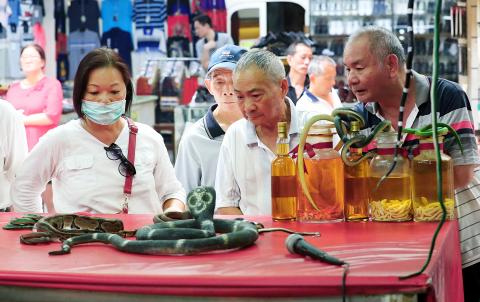The last snake restaurant in Taipei’s Huaxi Street Night Market (華西街觀光夜市), also known as “Snake Alley,” is to close today, with second-generation owner Kuo Yi-chien (郭懿堅) saying the shop is to be converted into a hot pot restaurant.
Six decades ago, Huaxi Street in the city’s Wanhua District (萬華) was a red-light district that featured brothels, street performers and snake-meat restaurants, said Kuo, who inherited his father’s restaurant, which has only ever served snake.
There were as many as eight snake restaurants in the area’s heyday, but the only two other remaining restaurants with snake on the menu now manly sell softshell turtle meat, Kuo said.

Photo: CNA
His father, Kuo Lai-kung (郭來貢), opened the Asia Snake Meat Store (亞洲蛇肉店) in his 20s and marketed his snake dishes and snake wine by slaughtering the animals in front of customers, he said.
The store was widely recognized because his father considered himself the nation’s top snake expert and kept an orangutan named A-bao (阿寶) trained to catch snakes, Kuo Yi-chien said.
However, as public awareness grew about the need for animal protection, the government banned the killing of protected species.
Meanwhile, the busker culture on Huaxi Street was dying out, which is why their family decided to stop serving snake, Kuo Yi-chien said.
As the store on No. 49 closes for the last time today, actor Kuo Tzu-chien (郭子乾) is to perform a mock snake slaughter at 10:30am and attendees will be given imitation snakes as souvernirs.
Sharing the news about the store’s closure on Facebook yesterday, cultural studies expert Jason Cheung (張哲生) recalled how tourists from around the world used to swarm to the street to watch snake-killing performances.
Kuo Lai-kung was a friend of Cheung’s father and both participated in China Youth Corps activities, Cheung said, adding that he has visited many places with them since childhood.
The store’s closure arouses complex emotions, because it not only signals the end of a restaurant, but the end of an era, Cheung said.
Many people expressed regret online over the store’s closure, with one saying that their skin problems were cured after they drank snake soup on the street.

Taiwan is to commence mass production of the Tien Kung (天弓, “Sky Bow”) III, IV and V missiles by the second quarter of this year if the legislature approves the government’s NT$1.25 trillion (US$39.78 billion) special defense budget, an official said yesterday. Commenting on condition of anonymity, a defense official with knowledge of the matter said that the advanced systems are expected to provide crucial capabilities against ballistic and cruise missiles for the proposed “T-Dome,” an advanced, multi-layered air defense network. The Tien Kung III is an air defense missile with a maximum interception altitude of 35km. The Tien Kung IV and V

The disruption of 941 flights in and out of Taiwan due to China’s large-scale military exercises was no accident, but rather the result of a “quasi-blockade” used to simulate creating the air and sea routes needed for an amphibious landing, a military expert said. The disruptions occurred on Tuesday and lasted about 10 hours as China conducted live-fire drills in the Taiwan Strait. The Civil Aviation Administration (CAA) said the exercises affected 857 international flights and 84 domestic flights, affecting more than 100,000 travelers. Su Tzu-yun (蘇紫雲), a research fellow at the government-sponsored Institute for National Defense and Security Research, said the air

A strong continental cold air mass is to bring pollutants to Taiwan from tomorrow, the Ministry of Environment said today, as it issued an “orange” air quality alert for most of the country. All of Taiwan except for Hualien and Taitung counties is to be under an “orange” air quality alert tomorrow, indicating air quality that is unhealthy for sensitive groups. In China, areas from Shandong to Shanghai have been enveloped in haze since Saturday, the ministry said in a news release. Yesterday, hourly concentrations of PM2.5 in these areas ranged from 65 to 160 micrograms per cubic meter (mg/m³), and pollutants were

Taiwan lacks effective and cost-efficient armaments to intercept rockets, making the planned “T-Dome” interception system necessary, two experts said on Tuesday. The concerns were raised after China’s military fired two waves of rockets during live-fire drills around Taiwan on Tuesday, part of two-day exercises code-named “Justice Mission 2025.” The first wave involved 17 rockets launched at 9am from Pingtan in China’s Fujian Province, according to Lieutenant General Hsieh Jih-sheng (謝日升) of the Office of the Deputy Chief of the General Staff for Intelligence at the Ministry of National Defense. Those rockets landed 70 nautical miles (129.6km) northeast of Keelung without flying over Taiwan,